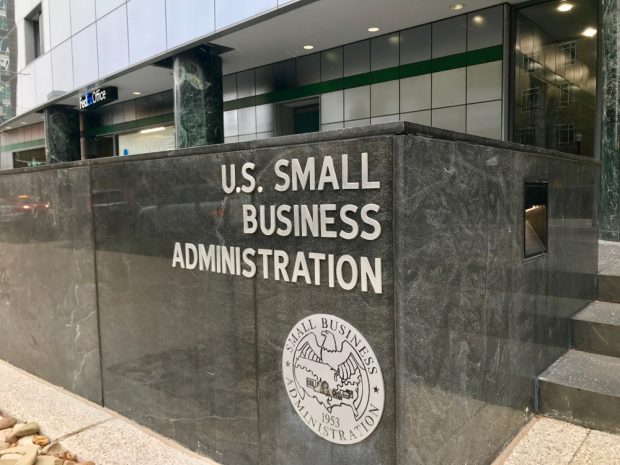 Small Business Administration headquarters building entrance (Image: Shutterstock).
Small Business Administration headquarters building entrance (Image: Shutterstock).
Credit union trade groups called on congressional leaders to replenish the Payroll Protection Act program and regulators to ease the way for small businesses to apply for coronavirus relief assistance once it becomes available.
"Credit unions have been instrumental in getting these needed funds to small businesses around the country over the past few weeks, and it's clear that these funds are providing a needed lifeline to impacted businesses," CUNA President/CEO Jim Nussle said.
Recommended For You
NAFCU President/CEO B. Dan Berger also called for additional funding for the PPP program.
"With the SBA's Payment Protection Program running out of funds after two short weeks, Congress must act to replenish the fund to ensure small businesses are able to keep their lights on and their employees paid during this uncertain economic time," he said.
Congress provided $349 billion for the PPP loan program to encourage small businesses to keep employees on the payroll during the coronavirus pandemic.
However, the program proved to be so popular that the money was exhausted in less than two weeks.
Congress has been struggling with setting aside more money for the program. Republicans said they wanted $250 million for the program and that they will deal with other stimulus measures in future legislation.
Democrats have said they want other assistance to be attached to any PPP bill. They have mentioned aid to health programs and additional money for the Community Development Financial Institutions program as possibilities.
The two sides remained stalemated at the end of the week.
But even as Congress struggles to add money to the program, credit union trade groups have been suggesting ways to make it easier for financial institutions to provide the loans.
Berger called on the SBA to set aside a portion of the money for credit unions, which he said have a large number of pending loan applications from small business owners.
In a letter to SBA Administrator Jovita Carranza, Berger said access requests to the SBA lending portals should be processed and approved even before the money becomes available.
In addition, he said, lenders that did not have previous SBA certification had trouble applying for it.
"It is important for credit unions that were not previously SBA-approved lenders to gain access quickly so they can process the backlog of applications received to help their communities survive this crisis," he wrote.
Berger also said the SBA must provide some clarity to the loan forgiveness provisions of the program.
Nussle agreed that credit unions have had trouble signing up for the program.
"Credit unions are eager to help Americans right now and have been doing so in many ways, but are limited when the tools that are given do not function properly," Nussle and state credit union leagues said earlier this week in a letter to Treasury Secretary Steven Mnuchin.
"Lack of support can derail a lending program, leading to frustrated lenders and borrowers," he wrote in citing problems with the loan process.
For instance, he said, it remains unclear whether the entire amount is made available to the borrower when it is disbursed.
© Touchpoint Markets, All Rights Reserved. Request academic re-use from www.copyright.com. All other uses, submit a request to [email protected]. For more inforrmation visit Asset & Logo Licensing.






